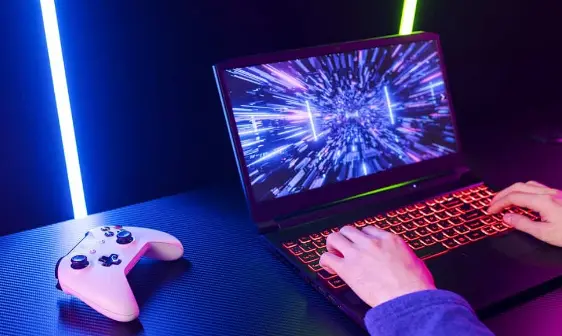Power Up Your Play: A Comprehensive Guide to Gaming Laptops
For passionate gamers, a desktop PC might be the ultimate dream machine, but for those who crave portability without sacrificing performance, gaming laptops offer the perfect solution. These powerful machines pack a serious punch, allowing you to enjoy the latest titles with stunning visuals and smooth gameplay – all while remaining mobile. But with a vast array of options available, choosing the right gaming laptop can be daunting. Worry not, fellow gamer! This comprehensive guide will equip you with the knowledge to navigate the world of gaming laptops and find the perfect match for your needs and budget.
Unveiling the Essentials: Key Components for Peak Performance
Gaming laptops prioritize performance above all else, and several key components determine their muscle:
-
Processor (CPU): The CPU, often an Intel Core i5 or i7 or AMD Ryzen 5 or 7, acts as the brain of the laptop, handling game logic and calculations. Opt for processors with high core counts and clock speeds for seamless performance.
-
Graphics Processing Unit (GPU): The GPU, typically an NVIDIA GeForce RTX or AMD Radeon RX series, is responsible for rendering graphics. Higher-end GPUs deliver stunning visuals with features like ray tracing for realistic lighting effects.
-
Random Access Memory (RAM): RAM acts as the laptop’s short-term memory, crucial for running games smoothly. Aim for at least 16GB of RAM for a lag-free gaming experience.
-
Storage: Solid-state drives (SSDs) offer significantly faster loading times compared to traditional hard disk drives (HDDs). Consider a combination of SSD for your operating system and frequently played games, and an HDD for additional storage.
-
Display: For an immersive gaming experience, prioritize a display with a high refresh rate (144Hz or higher) for smoother visuals and a quick response time to minimize ghosting. Resolution options include Full HD (1920×1080) and QHD (2560×1440), with some high-end laptops offering 4K displays for exceptional detail.
Matters of Mobility: Balancing Power and Portability
Gaming laptops are inherently bulkier than their non-gaming counterparts due to their powerful components. Consider your portability needs:
-
Screen Size: Laptops typically range from 15.6 inches to 17.3 inches. While larger screens offer a more immersive experience, they come at the expense of portability.
-
Weight: Gaming laptops can weigh anywhere from 4 to 8 pounds. If portability is a major concern, opt for a lighter model, but be prepared for potential compromises in performance.
-
Battery Life: Gaming laptops prioritize performance over battery efficiency. Expect battery life to be shorter compared to non-gaming laptops, typically lasting 2-4 hours under heavy use.
Beyond the Basics: Additional Features to Consider
While the core components are crucial, several other factors can influence your decision:
-
Keyboard: Mechanical keyboards offer a superior typing experience with better tactile feedback, important for fast-paced games.
-
Cooling System: Gaming laptops generate significant heat. Look for laptops with efficient cooling systems to prevent overheating and ensure optimal performance.
-
Connectivity: Multiple USB ports, an HDMI port for connecting to external displays, and a reliable Wi-Fi connection are essential for a smooth gaming experience.
-
Brand and Warranty: Reputable brands often offer better build quality, reliable customer service, and extended warranties for peace of mind.
Finding Your Perfect Match: A Spectrum of Options
The gaming laptop market caters to a range of budgets and needs:
-
Budget-Friendly Options: For casual gamers or those on a tighter budget, laptops with mid-range processors like an AMD Ryzen 5 or Intel Core i5 paired with an NVIDIA GeForce GTX or AMD Radeon RX graphics card offer decent performance at a lower price point.
-
Mid-Range Powerhouses: Offering a good balance between performance and price, these laptops typically feature high-end processors like Intel Core i7 or AMD Ryzen 7 CPUs paired with NVIDIA GeForce RTX or AMD Radeon RX graphics cards. They cater to serious gamers who demand smooth gameplay on most modern titles.
-
High-End Beasts: For the ultimate gaming experience, these top-of-the-line machines boast the most powerful processors and graphics cards available. They often feature high refresh rate displays with 4K resolution and premium features like mechanical keyboards. However, be prepared to pay a hefty price tag.


Comments are closed, but trackbacks and pingbacks are open.